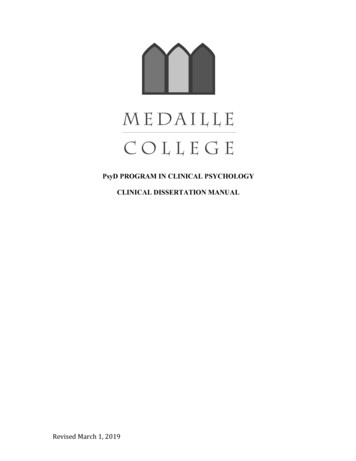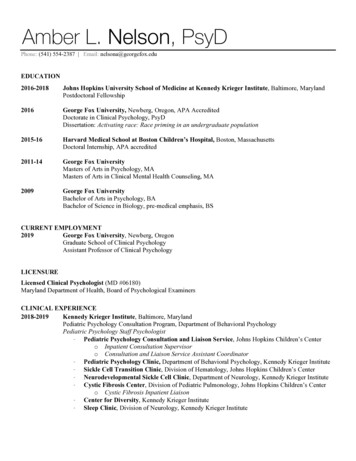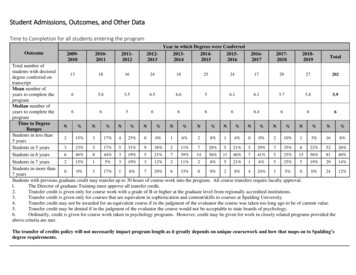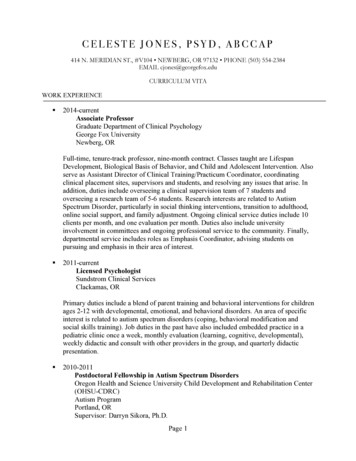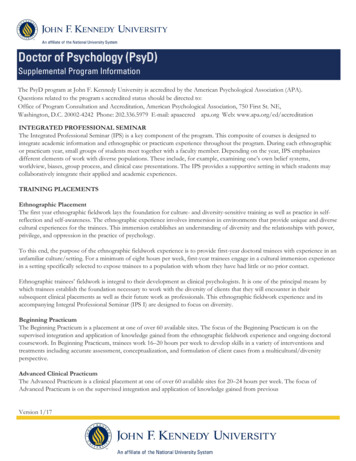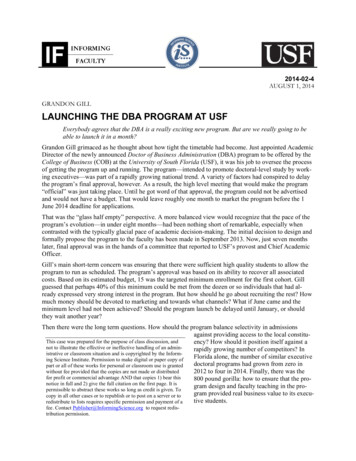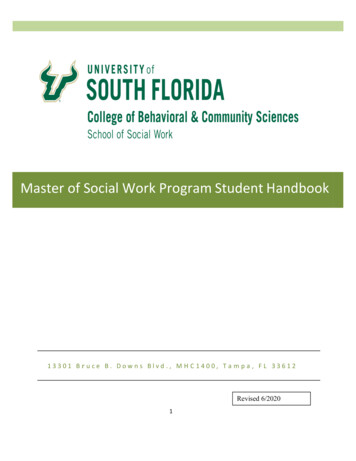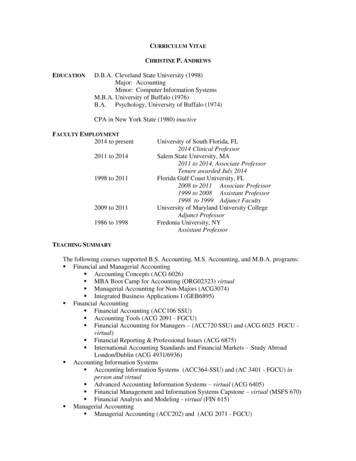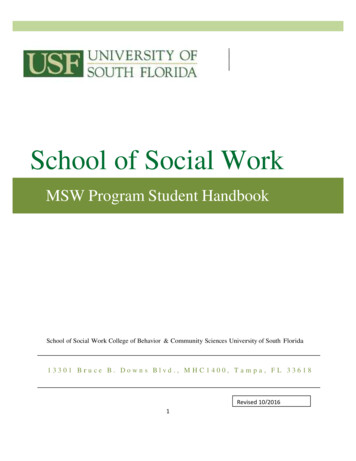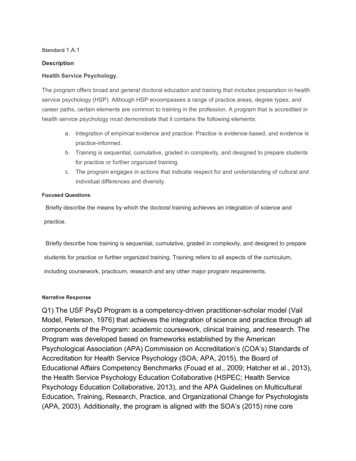
Transcription
Standard 1.A.1DescriptionHealth Service Psychology.The program offers broad and general doctoral education and training that includes preparation in healthservice psychology (HSP). Although HSP encompasses a range of practice areas, degree types, andcareer paths, certain elements are common to training in the profession. A program that is accredited inhealth service psychology must demonstrate that it contains the following elements:a. Integration of empirical evidence and practice: Practice is evidence-based, and evidence ispractice-informed.b. Training is sequential, cumulative, graded in complexity, and designed to prepare studentsfor practice or further organized training.c.The program engages in actions that indicate respect for and understanding of cultural andindividual differences and diversity.Focused QuestionsBriefly describe the means by which the doctoral training achieves an integration of science andpractice.Briefly describe how training is sequential, cumulative, graded in complexity, and designed to preparestudents for practice or further organized training. Training refers to all aspects of the curriculum,including coursework, practicum, research and any other major program requirements.Narrative ResponseQ1) The USF PsyD Program is a competency-driven practitioner-scholar model (VailModel, Peterson, 1976) that achieves the integration of science and practice through allcomponents of the Program: academic coursework, clinical training, and research. TheProgram was developed based on frameworks established by the AmericanPsychological Association (APA) Commission on Accreditation’s (COA’s) Standards ofAccreditation for Health Service Psychology (SOA; APA, 2015), the Board ofEducational Affairs Competency Benchmarks (Fouad et al., 2009; Hatcher et al., 2013),the Health Service Psychology Education Collaborative (HSPEC; Health ServicePsychology Education Collaborative, 2013), and the APA Guidelines on MulticulturalEducation, Training, Research, Practice, and Organizational Change for Psychologists(APA, 2003). Additionally, the program is aligned with the SOA’s (2015) nine core
competency areas in clinical training including ethical and legal standards, individualand cultural diversity, professional values, attitudes and beliefs, communication andinterprofessional skills, assessment, intervention, supervision, consultation, andinterprofessional and interdisciplinary skills.Q2) The USF PsyD Program subscribes to a developmental paradigm that supports andenhances the knowledge and skills students possess while providing didactic andexperiential learning in an increasingly challenging, sequential, and cumulative manner.Over the course of the Program, students are taught progressively advanced academicand clinical competencies. Below are descriptions of how USF PsyD Program trainingactivities are structured in a sequential, cumulative, and graded format. See also thePsyD Progression Chart (Appendix I.A.1.1.1), the Clinical Training Sequencingdocument (Appendix I.A.1.1.2), and the PsyD Curriculum Pattern (I.A.1.1.3).In year one, students take foundational courses, which include Professional Ethics,Laws, & Standards; Culture and Mental Health; Human Development; and AdvancedPsychopathology 1 & 2. They take a 2-semester pre-practicum series, which includes aSocialization to Clinical Training Seminar in the fall and Clinical Interviewing in thespring, to prepare them for clinical placements, which commence in year two.In the second year of study, students build on the foundation work from year one,delving into research courses (Quantitative Research Design; Statistics; and QualitativeResearch Design, Measurement and Analysis) as well as evidence based clinicalcourses (Psychodynamic, Humanistic, and Interpersonal; Cognitive Behavioral; andRelationship and Family). Students commence practicum training in the community andare provided Program Faculty supervision in a weekly, 3-hour course (Practicum 2a and2b).Third year is a continuation of clinical courses and other coursework aimed at preparingstudents for careers working with underserved populations in integrated healthcaresettings (i.e., Groups; Leadership, Consultation, and Interprofessional Collaboration;Psychopharmacology). Students participate in advanced P3 level practicum training,supported by Program Faculty supervision in a weekly, 3-hour course (Practicum 3aand 3b). Building on their research coursework from second year, students embark onthe development of their clinical dissertation proposal and are supported by ProgramFaculty through the Clinical Dissertation Proposal Seminar.In the third year, students also complete two qualifying examinations to demonstrateProgram competencies in order to advance to candidacy. In fall semester, students sitfor the Doctoral Comprehensive Qualifying Examination (DCQE) and in the end ofspring semester, they take a Standardized Patient Evaluation Examination (SPEE).Additional information is provided in Standard 1B1 and 1B2.
Fourth year concludes students’ rigorous academic preparation with a course on Theoryand Practice of Clinical Supervision and the opportunity to take 2 Electives, which arebuilt into the curriculum. Students are encouraged to complete their research anddissertation writing and are supported by Program Faculty through the ClinicalDissertation Seminar. Student complete a fourth year advanced P4 practicum in thecommunity and are supervised and mentored by Program Faculty in the weekly, 3-hourPracticum 4a and 4b series.References:American Psychological Association. (2003). Guidelines on multicultural education, training, research, practice, and organizational changefor Psychologists. American Psychologist , 58 (5), 377-402.American Psychological Association. (2015). Standards of accreditation for health service psychology . Retrieved on July 18, 2015 fromAmerican Psychological Association Web site: /standards-of-accreditation.pdfFouad, N. A., Grus, C. L., Hatcher, R. L., Kaslow, N. J., Hutchings, P. S., Madson, M. B., Crossman, R. E. (2009). Competency benchmarks:A model for understanding and measuring competence in professional psychology across training levels. [Supplemental material]. Trainingand Education in Professional Psychology , 3 (4), 5-26. DOI 10.1037/a0015832Hatcher, R. L., Fouad, N. A., Grus, C. L., Campbell, L. F., McCutcheon, S. R., & Leahy, K. L.(2013). Competency benchmarks: Practicalsteps toward a culture of competence. Training and Education in Professional Psychology , 7 (2), 84–91. DOI 10.1037/a0029401Health Service Psychology Education Collaborative. (2013). Professional psychology in health care services: A blueprint for education andtraining. American Psychologist, 68 (6), 411-426. DOI 10.1037/a0033265Peterson, D. R. (1976). Need for the doctor of psychology degree in professional psychology. American Psychologist , 31 (11), 756–764.Standard 1.A.2DescriptionPractice Area.Health service psychology includes several practice areas in which an accredited program may focus,including the areas of clinical psychology, counseling psychology, school psychology, combinations ofthese areas, and other developed practice areas.Focused QuestionsIdentify the program's area of practice.Narrative ResponseThe Program’s area of practice is Clinical Psychology with an emphasis ininterprofessional practice in integrated care settings working with underservedpopulations.1.B.1Standard DescriptionAdministrative Structure.
The program's purpose must be pursued in an institutional setting appropriate for doctoral education andtraining in health service psychology. The institution must have a clear administrative structure andcommitment to the doctoral program.a. The sponsoring institution of higher education must be authorized under applicable law orother acceptable authority to provide a program of postsecondary education and haveappropriate graduate degree-granting authority. This includes state authorization andaccreditation of the institution by a nationally recognized regional accrediting body in theUnited States.b. The program is an integral part of the mission of the academic department, college, school,or institution in which it resides. It is represented in the institution's operating budget andplans in a manner that supports the training mission of the program. Funding and resourcesare stable and enable the program to achieve its aims.Focused QuestionsIdentify the regional accrediting body that recognizes the sponsoring institution and current accreditationstatus with this body.Discuss how the program is integral to the department, college, school, or institution.Briefly describe the mission(s) of the agency or institution which sponsors/hosts the doctoral trainingprogram and explain how the training program fits within this mission. How is it viewed/valued by thesponsor institution and its administration?Discuss the adequacy and stability of the doctoral program's budget.Narrative ResponseQ1) The University of San Francisco is accredited by the WASC Senior College andUniversity Commission (WSCUC), an accreditation first granted in 1950 by the WesternCollege Association (WCA), the antecedent of WASC. In 2010, WASC reaffirmedUSF’s accreditation for 9 years. The USF PsyD Program was initially accredited by theWestern Association of Schools and Colleges (WASC) in 2012. The university’s nextaccreditation visit is scheduled for fall 2018 and WSCUC will make the decision onreaffirming accreditation in February 2019.Q2) The PsyD Program is housed in the School of Nursing and Health Professions’(SONHP) Department of Integrated Healthcare with two other clinical doctoral
programs: Family Nurse Practitioner (FNP) and Psychiatric Mental Health NursePractitioner (PMHNP). The PsyD Program is integral to the School of Nursing andHealth Profession’s (SONHP’s) goal to become a leader in the provision ofinterprofessional training and practice. The mission of the School of Nursing & HealthProfessions is to “advance nursing and health professions education within the contextof the Jesuit tradition” (See Appendix I.B.1.1.1). The School uses dynamic andinnovative approaches in undergraduate and graduate education to prepareprofessionals for current and future practice domains. The goal is to effectively linkclassroom, clinical, and field experiences with expectations for competence,compassion, and justice in health care, protection and promotion within the context ofthe highest academic standards. The PsyD Program’s position within the School ofNursing and Health Professions (SONHP) is integral to the School’s ability to provideinterprofessional education and clinical training opportunities to students, which willenable them to have a competitive edge in the evolving healthcare system. The PsyDProgram faculty also make important contributions to the School through theirinvolvement in the School’s standing committees, including Curriculum, ProgramEvaluation, and Academic Standards. PsyD Program faculty have also been integral inthe development of a new standing committee on diversity, equity, and inclusion, whichis an important growth area for the school. Additionally, the social justice mission of thePsyD Program is essential to supporting the Jesuit values of the institution itself, whichwill be outlined further in the next question.Q3) The PsyD Program focuses on integrated behavioral health with underservedpopulations, which perfectly aligns with the Vision, Mission, and Values of the Universityof San Francisco (see Appendix I.B.1.1.1) and the University’s Strategic Priorities (seeAppendix I.B.1.1.2). Central to the mission of this non-profit university is the preparationof men and women to shape a multicultural world with generosity, compassion, andjustice. The University’s Vision, Mission, and Values Statement speaks to theinstitution’s commitment to actively serving local, national, and internationalcommunities: “The University’s core values include a belief in and a commitment toadvancing a culture of service that respects and promotes the dignity of every person”(see Appendix I.B.1.1.1). This mission permeates all aspects of the institution, includingstudent learning and faculty development, curriculum design, program and degreeofferings, alumni relations, publications, and a host of other institutional features.Likewise, the University’s current Strategic Priorities call for “an academically excellenteducation that offers the knowledge, skills, values, sensitivities and motivation tosucceed in a chosen profession, field or career and contribute to a more humane andjust world for all” (see Appendix I.B.1.1.2).Consistent with the University’s and based on Jesuit values, the mission of the PsyDProgram is “to offer a rigorous program of study that emphasizes clinical and scholarly
work with underserved populations and focuses on training culturally responsive healthservice psychologists to work in interprofessional, integrated behavioral health settings”(see Appendix I.B.1.1.1).The institution and administration highly value the addition of the PsyD Program to theSchool of Nursing and Health Professions (SONHP). This has been demonstrated bythe administration’s ongoing commitment to providing necessary resources to ensurethe successful development and accreditation of the PsyD Program. The Universityvalues quality programs and has invested significant resources in the accreditationprocesses of various academic programs across schools as well as investing in theAPA Accreditation of the Doctoral Internship Program in the University’s Counseling andPsychological Services. Please see a letter of support for the Psy.D. program from theUniversity President in Appendix I.B.1.1.3.Q4) The fiscal resources regularly made available to the Program are more thansufficient to enable it to fulfill its mission and goals. Revenue data for each academicyear informs the University’s central budget for the planning process described below.The yearly budget, including the Program’s financial resources, is based on a 5-yearprojection.The PsyD Program budget included an incremental appointment for each of the first 4years of the Program, representing a 1:8 ratio of core faculty to doctoral students. Fourof these appointments are in tenure-track lines, again demonstrating the stability of theUniversity’s vision for the Program within its fiscal structure. The University hasdemonstrated a strong commitment of resources to the Program since the early stagesof Program planning, with the very first steps toward implementation consisting of asignificant contribution of resources.1.B.2Standard DescriptionAdministrative Responsibilities Related to Cultural and Individual Differences and Diversity.The program recognizes the importance of cultural and individual differences and diversity in the trainingof psychologists. The Commission on Accreditation defines cultural and individual differences anddiversity as including, but not limited to, age, disability, ethnicity, gender, gender identity, language,national origin, race, religion, culture, sexual orientation, and socioeconomic status. The program hasmade systematic, coherent, and long-term efforts to attract and retain students and faculty from diversebackgrounds into the program. Consistent with such efforts, it acts to ensure a supportive andencouraging learning environment appropriate for the training of individuals who are diverse and theprovision of training opportunities for a broad spectrum of individuals. Further, the program avoids any
actions that would restrict program access on grounds that are irrelevant to success in graduate training,either directly or by imposing significant and disproportionate burdens on the basis of the personal anddemographic characteristics set forth in the definition of cultural diversity. Because of the United States'rich diverse higher education landscape, training can take place in both secular and faith-based settings.Thus this requirement does not exclude programs from having a religious affiliation or purpose andadopting and applying admission and employment policies that directly relate to this affiliation or purpose,so long as public notice of these policies has been made to applicants, students, faculty, and staff beforetheir application or affiliation with the program. These policies may provide a preference for personsadhering to the religious purpose or affiliation of the program, but they shall not be used to preclude theadmission, hiring, or retention of individuals because of the personal and demographic characteristics setforth under the definition of cultural diversity. This provision is intended to permit religious policies as toadmission, retention, and employment only to the extent that they are protected by the U.S. Constitution.This provision will be administered as if the U.S. Constitution governed its application. Notwithstandingthe above, and regardless of a program's setting, the program may not constrain academic freedom orotherwise alter the requirements of these standards. Finally, compelling pedagogical interests require thateach program prepare graduates to navigate cultural and individual differences in research and practice,including those that may produce value conflicts or other tensions arising from the intersection of differentareas of diversity.Focused QuestionsProvide a brief general orienting narrative statement regarding how the program engages in actions thatindicate respect for and understanding of cultural and individual differences and diversity. Include herereferences to any existing policies, plans, or procedures related to cultural and individual differences anddiversity for the institution or program under review. A more detailed, in depth response will occur withinStandards III and IV.Does this program adhere to a religious affiliation or purpose that informs its admission and/oremployment policies? If so, describe how these policies are made known to applicants, students, faculty,and staff before their application to or affiliation with the program.Narrative ResponseQ1) The Program uses a cultural accountability training model to describe theoverarching frame of the Program. The term cultural accountability encompasses two
major aspects of clinical training: cultural competence (Comas-Diaz, 2012) and culturalhumility (Fisher-Borne, Cain, & Martin, 2015). This training model includes therecruitment and retention of diverse faculty and students, academic coursework, clinicaltraining, research, and program evaluation.This cultural respect and understanding is reflected in the Program’s policies forrecruitment (see attached Student Handbook in Appendix I.B.2.1.1, p. 47), admissions(see attached Student Handbook, p. 50), and retention (see Student Handbook, p. 54),as well as in all aspects of academics and clinical training. Additionally, the Programconforms to the University’s nondiscriminatory policies and operating conditions, andavoids any actions that would restrict program access on grounds that are irrelevant tosuccess in a doctoral program or the profession (see non-discriminatory statement inAppendix I.B.2.1.2).Q2) Although the University and Program are inspired by Jesuit ideals, the Programdoes not adhere to any religious affiliation or purpose that impacts its admission and oremployment policies. Although affiliated with the Jesuit Catholic order, the University ofSan Francisco is legally and financially separate from the Catholic Church, is governedby a largely lay Board of Trustees, and has never had an academic freedom issueraised by any accreditation body because of its Jesuit affiliation.Comas-Diaz, L. (2012). Multicultural care: A clinician’s guide to cultural competence . Washington, DC: American Psychological Association.Fisher-Borne, M., Cain, J. M., & Martin, S. L. (2015). From
Health service psychology includes several practice areas in which an accredited program may focus, including the areas of clinical psychology, counseling psychology, school psychology, combinations
